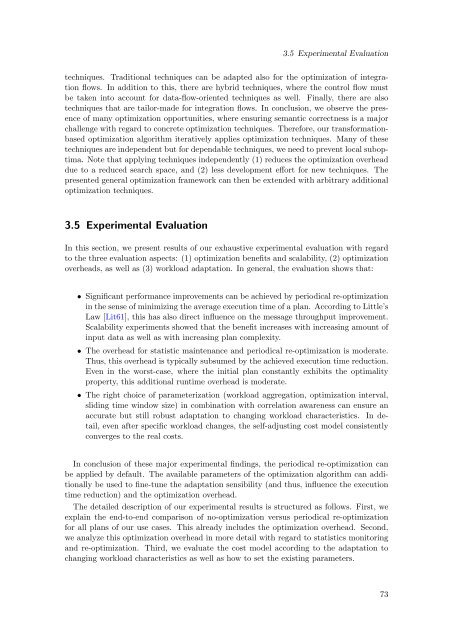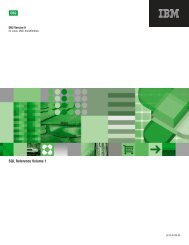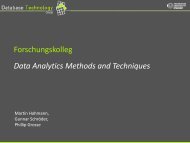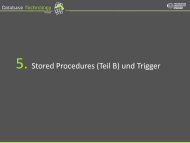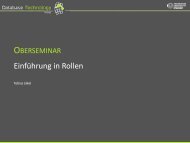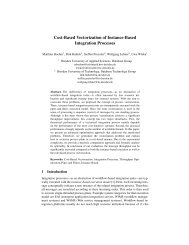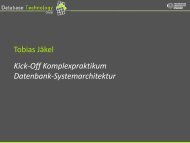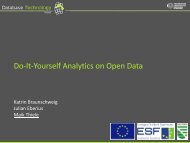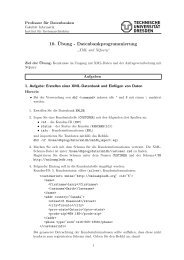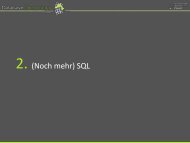Cost-Based Optimization of Integration Flows - Datenbanken ...
Cost-Based Optimization of Integration Flows - Datenbanken ...
Cost-Based Optimization of Integration Flows - Datenbanken ...
- No tags were found...
You also want an ePaper? Increase the reach of your titles
YUMPU automatically turns print PDFs into web optimized ePapers that Google loves.
3.5 Experimental Evaluation<br />
techniques. Traditional techniques can be adapted also for the optimization <strong>of</strong> integration<br />
flows. In addition to this, there are hybrid techniques, where the control flow must<br />
be taken into account for data-flow-oriented techniques as well. Finally, there are also<br />
techniques that are tailor-made for integration flows. In conclusion, we observe the presence<br />
<strong>of</strong> many optimization opportunities, where ensuring semantic correctness is a major<br />
challenge with regard to concrete optimization techniques. Therefore, our transformationbased<br />
optimization algorithm iteratively applies optimization techniques. Many <strong>of</strong> these<br />
techniques are independent but for dependable techniques, we need to prevent local suboptima.<br />
Note that applying techniques independently (1) reduces the optimization overhead<br />
due to a reduced search space, and (2) less development effort for new techniques. The<br />
presented general optimization framework can then be extended with arbitrary additional<br />
optimization techniques.<br />
3.5 Experimental Evaluation<br />
In this section, we present results <strong>of</strong> our exhaustive experimental evaluation with regard<br />
to the three evaluation aspects: (1) optimization benefits and scalability, (2) optimization<br />
overheads, as well as (3) workload adaptation. In general, the evaluation shows that:<br />
• Significant performance improvements can be achieved by periodical re-optimization<br />
in the sense <strong>of</strong> minimizing the average execution time <strong>of</strong> a plan. According to Little’s<br />
Law [Lit61], this has also direct influence on the message throughput improvement.<br />
Scalability experiments showed that the benefit increases with increasing amount <strong>of</strong><br />
input data as well as with increasing plan complexity.<br />
• The overhead for statistic maintenance and periodical re-optimization is moderate.<br />
Thus, this overhead is typically subsumed by the achieved execution time reduction.<br />
Even in the worst-case, where the initial plan constantly exhibits the optimality<br />
property, this additional runtime overhead is moderate.<br />
• The right choice <strong>of</strong> parameterization (workload aggregation, optimization interval,<br />
sliding time window size) in combination with correlation awareness can ensure an<br />
accurate but still robust adaptation to changing workload characteristics. In detail,<br />
even after specific workload changes, the self-adjusting cost model consistently<br />
converges to the real costs.<br />
In conclusion <strong>of</strong> these major experimental findings, the periodical re-optimization can<br />
be applied by default. The available parameters <strong>of</strong> the optimization algorithm can additionally<br />
be used to fine-tune the adaptation sensibility (and thus, influence the execution<br />
time reduction) and the optimization overhead.<br />
The detailed description <strong>of</strong> our experimental results is structured as follows. First, we<br />
explain the end-to-end comparison <strong>of</strong> no-optimization versus periodical re-optimization<br />
for all plans <strong>of</strong> our use cases. This already includes the optimization overhead. Second,<br />
we analyze this optimization overhead in more detail with regard to statistics monitoring<br />
and re-optimization. Third, we evaluate the cost model according to the adaptation to<br />
changing workload characteristics as well as how to set the existing parameters.<br />
73


